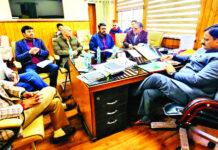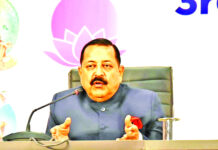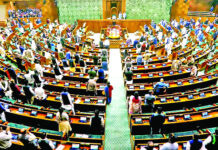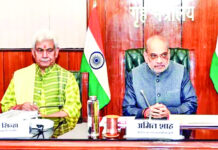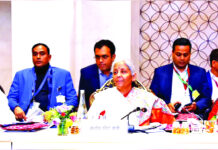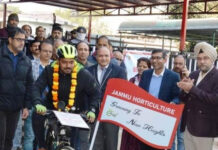It is unfortunate that even as we have sustainable practices for plastic use, along with laws and regulations in place, enforcement remains extremely weak
On World Environment Day 2018, the United Nations Environment Programme (UNEP) brought out an informative publication along with other partners where it said: “Our planet is drowning in plastic pollution.” It stated that while plastic has many valuable uses, we have become addicted to single-use or disposable plastic despite severe environmental consequences. For instance, around the world, one million plastic drinking bottles are purchased every minute, while up to five trillion single-use plastic bags are used worldwide every year.
Overall, half of all the plastic bags produced are designed to be used only once and then just thrown away. Between the 1950s and the 70s, only a small quantity of plastic was produced. Hence, the problem was largely manageable but by the 1990s, plastic waste generation more than tripled in two decades following a similar rise in plastic production. And in the early 2000s, our output of plastic waste grew more in a single decade than it had in the previous 40 years. As a result, the world is producing about 300 million tonnes of plastic waste every year, which, according to UNEP, is nearly equivalent to the weight of the entire human population (which in any case has become obese). The estimate is that more than 8.3 billion tonnes of plastic have been produced since the early 1950s and about 60 per cent of that quantity has ended up in either a landfill or the natural environment. It has also been observed that the rate of plastic production has grown faster than that of any other material, with a shift away from durable plastic towards single-use plastic applications.
Recently, Prime Minister Narendra Modi called for a mass movement. On October 2 this year, when we celebrate Mahatma Gandhi’s 150th birth anniversary, we should lay the foundation of a new revolution against plastic by people themselves throughout the country. He appealed to all strata of society to celebrate Gandhi Jayanti this year as a day to make “Mother India plastic-free.” This, of course, would require municipalities, municipal corporations, district administrations, gram panchayats as well as Government and non-governmental bodies to work towards ensuring adequate arrangements for collection and storage of plastic waste and most importantly drastically reducing the consumption of single-use plastic.
There are some societies where plastic waste has been managed with some changes in policies and market instruments. An example lies in Britain’s supermarkets cutting down on plastic bags for shopping but of course, much more needs to be done. According to Greenpeace, the 10 largest supermarkets are adding 810,000 tonnes of single-use plastic to the world every year. There is a charge of five pennies for plastic bags in Britain’s supermarkets, which has resulted in significant progress but two billion of these bags were still sold to the country’s shoppers in the last year by Morrisons, a major supermarket chain.
There are NGOs in several countries which are also responsible for programmes which target single-use plastic. A brother and sister, Carter Ries and Olivia Ries, established an NGO at the ages of 8.5 and seven years respectively in 2009. This NGO, ‘One More Generation’, has launched a major programme called “One Less Straw.” According to the website of One Less Straw, each year 100,000 marine animals and over a million sea birds die from ingesting plastic. And consumers in the US use 500,000,000 straws every day. According to the authors, that’s enough straws to fill 46,400 large school buses per year. It also put forward data that daily American consumption is equal to enough plastic straws to wrap around earth’s circumference 2.5 times. Yet, almost every restaurant in the US serves drinks in glasses with a straw placed inside, whether the consumer wants it or not.
In India, the entire issue of solid waste management, including efforts to eliminate single-use plastic, requires transformative change. First, the use of plastic bottles for drinking water is a problem that can be eliminated if municipal water supply was to conform to the standards for drinking purposes. Many cities in the world have achieved this outcome, including the city of Paris, well over a decade ago.
There is need for a comprehensive plan of action that would require initiatives on a decentralised basis by which single-use plastic can be reduced rapidly and then eliminated within a definite time period beginning on the Mahatma’s birth anniversary on October 2. The country has seen several efforts by gaurakshaks and others to prevent the slaughter of cows. However, it is well-known that a large number of cows suffer physically because they consume large quantities of plastic available on roads, drains and public places. Plastic in the stomach of a cow causes acute pain, physical problems and mortality. It would be very useful if those interested in welfare of cows would work together to eliminate single-use plastic from public places.
The solution to the mounting problem of single-use plastic is not simple. The answer lies in creating consciousness and action for overall solid waste management because particularly with urbanisation, the volumes of solid waste have grown substantially. Till even 10 to 15 years ago, the quantity of solid waste found beside railway tracks was significantly lower and now this is an ugly eye sore. Sadly, there are also dumping sites in the mountains where solid waste continues to be thrown in large quantities.
Unfortunately, a large part of single-use plastic waste goes into the streams and rivers, which then carry it to the oceans, apart from ruining the quality of water in the rivers themselves. Among the 10 rivers identified across the world, the Indus and Ganga rank among the top. Overall, the time has come for India to pursue a pattern of development, which is distinctly different from the practices followed in developed countries, which have produced huge negative externalities. The pattern which we develop will hold useful lessons for the rest of the world as well.
Unfortunately, even where we have specified sustainable practices with adequate laws and regulation, enforcement remains extremely weak.
With the Prime Minister now bearing in on this issue, it is to be hoped that regulatory institutions and law enforcement agencies will perform effectively in this area. And on Mahatma Gandhi’s birth anniversary, we must recall his words “ …I make it bold to say that the Europeans will have to remodel their outlook, if they are not to perish under the weight of the comforts to which they are becoming slaves.”
(The writer is former chairman, Intergovernmental Panel on Climate Change, 2002-15)



